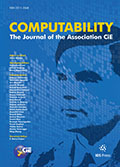Authors: Basu, Sankha S. | Simpson, Stephen G.
Article Type:
Research Article
Abstract:
In this paper we study a model of intuitionistic higher-order logic which we call the Muchnik topos . The Muchnik topos may be defined briefly as the category of sheaves of sets over the topological space consisting of the Turing degrees, where the Turing cones form a base for the topology. We note that our Muchnik topos interpretation of intuitionistic mathematics is an extension of the well known Kolmogorov/Muchnik interpretation of intuitionistic propositional calculus via Muchnik degrees, i.e., mass problems under weak reducibility. We introduce a new sheaf representation of the intuitionistic real numbers, the Muchnik reals , which are
…different from the Cauchy reals and the Dedekind reals. Within the Muchnik topos we obtain a choice principle ( ∀ x ∃ y A ( x , y ) ) ⇒ ∃ w ∀ x A ( x , w x ) and a bounding principle ( ∀ x ∃ y A ( x , y ) ) ⇒ ∃ z ∀ x ∃ y ( y ⩽ T ( x , z ) ∧ A ( x , y ) ) where x , y , z range over Muchnik reals, w ranges over functions from Muchnik reals to Muchnik reals, and A ( x , y ) is a formula not containing w or z . For the convenience of the reader, we explain all of the essential background material on intuitionism, sheaf theory, intuitionistic higher-order logic, Turing degrees, mass problems, Muchnik degrees, and Kolmogorov’s calculus of problems. In a separate document we provide an English translation of Muchnik’s 1963 paper on Muchnik degrees.
Show more
Keywords: Degrees of unsolvability, Muchnik degrees, mass problems, intuitionism, computable analysis, higher-order logic, topos theory, sheaves, sheaf theory, Kolmogorov
DOI: 10.3233/COM-150041
Citation: Computability,
vol. 5, no. 1, pp. 29-47, 2016
Price: EUR 27.50





